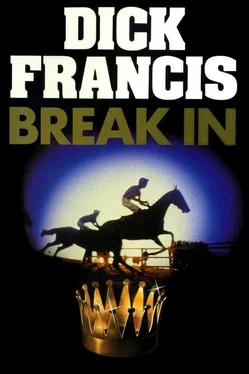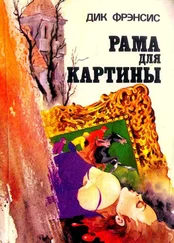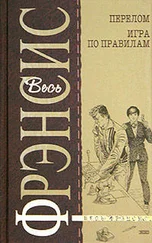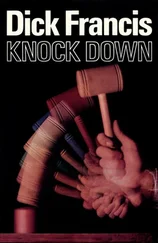‘We were afraid you might win them again,’ Lady Vaughnley explained sweetly, ‘so this year it’s a figure like the others,’ and she pressed warmly into my hands a little golden man calling out the news to the days before printing.
I genuinely thanked her. I had more cufflinks already than shirts with cuffs to take them.
‘What a finish you gave us,’ she said, smiling. ‘My husband is thrilled. Like an arrow from nowhere, he said.’
‘We were lucky.’
I looked automatically to her shoulder, expecting to greet also her son, who at all other Towncriers had accompanied his parents, hovering around and running errands, willing, nice-natured, on the low side of average for brains.
‘Your son isn’t with you?’ I asked.
Most of Lady Vaughnley’s animation went into eclipse. She glanced swiftly and uncomfortably across to her husband, who hadn’t heard my remark, and said unhappily, ‘No, not today.’
‘I’m sorry,’ I said; not for Hugh Vaughnley’s absence, but for the obvious row in the family. She nodded and turned away, blinking, and I thought fleetingly that the trouble must be new and bad, near the surface of tears.
The princess invited Lord and Lady Vaughnley to her box and they happily accepted.
‘You as well, Kit,’ she said.
‘I’m riding in the next race.’
‘Come after.’
‘Yes. Thank you.’
Everyone left their trophies on the presentation table to be taken away for engraving and I returned to the changing room as the princess moved away with the Vaughnleys.
She always asked me to her box because she liked to discuss her horses and what they’d done, and she had a loving and knowledgeable interest in all of them. She liked most to race where she rented a private box, namely at Cheltenham, Ascot, Sandown and Lingfield, and she went only to other courses where she had standing invitations from box-endowed friends. She was not democratic to the point of standing on the open stands and yelling.
I came out in the right colours for the next race and found Holly fiercely at my elbow immediately.
‘Have you collected your winnings?’ I asked.
‘I couldn’t reach you,’ she said disgustedly. ‘All those officials, keeping everyone back, and the crowds...’
‘Look, I’m sorry. I’ve got to ride again now.’
‘Straight after, then.’
‘Straight after.’
My mount in that race, in contrast to North Face, was unexciting, unintelligent and of only run-of-the-mill ability. Still, we tried hard, finished third, and seemed to give moderate pleasure to owners and trainer. Bread and butter for me: expenses covered for them. The basic fabric of jump racing.
I weighed in and changed rapidly into street clothes, and Holly was waiting when I came out.
‘Now, Kit...’
‘Um,’ I said. ‘The princess is expecting me.’
‘No! Kit!’ She was exasperated.
‘Well... it’s my job.’
‘Don’t come to the office, you mean?’
I relented. ‘OK. What’s the matter?’
‘Have you seen this?’ She pulled a page torn from a newspaper called the Daily Flag out of her shoulder bag. ‘Has anyone said anything in the weighing room?’
‘No and no,’ I said, taking the paper and looking where she was pointing with an agitated stabbing finger. ‘I don’t read that rag.’
‘Nor do we, for God’s sake. Just look at it.’
I glanced at the paragraph which was boxed by heavy red lines on a page entitled ‘Intimate Details’, a page well known to contain information varying from stale to scurrilous and to be intentionally geared to stirring up trouble.
‘It’s yesterday’s,’ I said, looking at the date.
‘Yes, yes. Read it.’
I read the piece. It said:
Folk say the skids are under Robertson (Bobby) Allardeck (32), racehorse-trainer son of tycoon Maynard Allardeck (50). Never Daddy’s favourite (they’re not talking), Bobby’s bought more than he can pay for, naughty boy, and guess who won’t be coming to the rescue. Watch this space for more.
Robertson (Bobby) Allardeck (32) was my sister Holly’s husband.
‘It’s libellous,’ I said. ‘Bobby can sue.’
‘What with?’ Holly demanded. ‘We can’t afford it. And we might not win.’
I looked at the worry in her normally unlined face.
‘Is it true, then?’ I said.
‘No. Yes. In a way. Of course he’s bought things he can’t pay for. Everyone does. He’s bought horses. It’s yearling sale time, dammit. Every trainer buys yearlings he can’t pay for. It’s natural, you know that.’
I nodded. Trainers bought yearlings at auction for their owners, paying compulsorily for them on the spot and relying on the owners to reimburse them fairly soon. Sometimes the owners backed out after a yearling had been bought; sometimes trainers bought an extra animal or two to bring on themselves and have ready for a later sale at a profit. Either way, at sale time, it was more common than not to borrow thousands short term from the bank.
‘How many has Bobby bought that he can’t sell?’ I asked.
‘He’ll sell them in the end, of course,’ she said, staunchly.
Of course. Probably. Perhaps.
‘But now?’
‘Three. We’ve got three.’
‘Total damage?’
‘More than a hundred thousand.’
‘The bank paid for them?’
She nodded. ‘It’s not that it won’t be all right in the end, but where did that disgusting rag get the information from? And why put it in the paper at all? I mean, it’s pointless.’
‘And what’s happened?’ I asked.
‘What’s happened is that everyone we owe money to has telephoned demanding to be paid. I mean, horrible threats, really, about taking us to court. All day yesterday... and this morning the feed-merchant rang and said he wouldn’t deliver any more feed unless we paid our bill and we’ve got thirty horses munching their heads off, and the owners are on the line non-stop asking if Bobby’s going to go on training or not and making veiled hints about taking their horses away.’
I was sceptical. ‘All this reaction from that one little paragraph?’
‘Yes.’ She was suddenly close to tears. ‘Someone pushed the paper through the letter-box of half the tradesmen in Newmarket, open at that page with that paragraph outlined in red, just like this. The blacksmith showed me. It’s his paper. He came to shoe some of the horses and made us pay him first. Made a joke of it. But all the same, he meant it. Not everyone’s been so nice.’
‘And I suppose you can’t simply just pay everyone off and confound them?’
‘You know we can’t. The bank manager would bounce the cheques. We have to do it gradually, like we always do. Everyone will get paid, if they wait.’
Bobby and Holly lived in fairly usual fashion at permanent full stretch of their permitted overdraft, juggling the incoming cheques from the owners with the outgoing expenses of fodder, wages, overheads and taxes. Owners sometimes paid months late, but the horses had to be fed and the lads’ wages found to the minute. The cash flow tended to suffer from air locks.
‘Well,’ I said, ‘go for another triple gin while I talk to the princess.’
The Princess Casilia, Mme de Brescou (to give her her full style), had as usual asked a few friends to lunch with her to watch the races, and her box contained, besides herself and the Vaughnleys, a small assortment of furs and tweeds, all With inhabitants I’d formerly met on similar occasions.
‘You know everyone, don’t you?’ the princess said, and I nodded ‘Yes’, although I couldn’t remember half their names.
‘Tea?’ she asked.
‘Yes, thank you.’
The same waitress as usual smoothly gave me a full cup, smiling. No milk, no sugar, slice of lemon, as always.
Читать дальше




